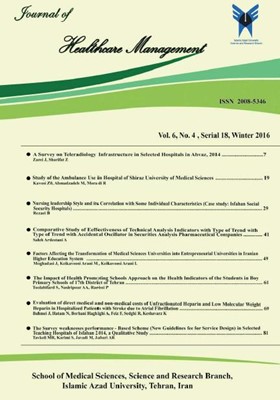Nursing leadership Style and its Correlation with Some Individual Characteristics (Case study: Isfahan Social Security Hospitals)
Subject Areas : medical documents
1 - Assistant Professor, Nursing Department, Nursing & Midwifery School, Falavarjan Branch, Islamic Azad University, Isfahan, Iran, beh
Keywords: personal characteristics, Nursing Managers, Leadership Styles,
Abstract :
Introduction: Leadership style is one of the factors that increase the efficiency and effectiveness of organizations. Today, in health care, nursing managers need to use leadership styles which are appropriate for complex and constantly changing health-care system. This study aimed to determine the leadership style of nursing managers and its relationship with some individual characteristics. Methods: This study is a descriptive- cross sectional research. The statistical population consisted of nurse managers working in three Esfahan social security hospitals (n = 61) who were studied census. A two-part questionnaire was used to collect data, researcher made the first part and the second part standardized measure includes individual questions determine the leadership style (LBDQ) the validity and reliability of which were confirmed. Data analysis using correlation coefficient, analysis of variance and mann-whitney by software spss at a significance level was 0.05. Results: The results showed that the mean score of majority of managers in terms of people-oriented and task-oriented in the medium level. There was no significant relationship between individual characteristics (age, sex, marital status, education, clinical experience, management experience) with leadership style. But there was a significant coloration between leadership style and managerial level. (p<0.05) Conclusion: Considering that the mean score of majority of nursing managers' leadership style was in moderate level, it would be beneficial to carry out measures for promoting leadership styles through management training.

